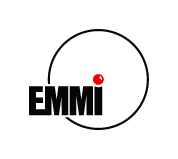Sprecher
Beschreibung
Around closed shells, intruder orbitals with large angular momentum difference and opposite parity compared to the ground state orbital lead to an accumulation of isomeric states. Below the $N=82$ shell, low-lying states in the even-$Z$, $N=81$ isotones are the $J^\pi = 1/2^{+}, 3/2^{+}$ and $11/2^{-}$ neutron-hole states, associated with the $s_{1/2}$, $d_{3/2}$, and $h_{11/2}$ orbitals, respectively. From $^{131}_{\phantom{1}50}$Sn to $^{149}_{\phantom{1}68}$Er, the $J^\pi = 11/2^-$ states are isomeric, in $^{129}_{\phantom{1}48}$Cd this becomes the ground state [1]. In this chain of isomers, the excitation energy remains constant at $750\,$keV from $^{139}_{\phantom{1}58}$Ce to $^{149}_{\phantom{1}68}$Er, which is a unique feature on the nuclear chart for long-lived isomeric states.
Recently [2], this chain was extended towards the proton drip line using TITAN's multiple-reflection time-of-flight mass spectrometer (MR-TOF-MS) at TRIUMF. MR-TOF-MS are a powerful tool to discover long-lived isomers [4, 5] and study their properties [6]. Masses of neutron-deficient Yb isotopes including the ground and isomeric state in $^{151}_{\phantom{1}70}$Yb were measured, and the excitation energy of the $J^\pi = 11/2^-$ isomer in $^{151}_{\phantom{1}70}$Yb was thus derived. The new value falls in line with the observed systematics. State-of-the-art mean field calculations including shape degrees of freedom were performed to unravel the constancy of the excitation energies. The measurements and the theoretical results will be presented.
[1] V. Manea et al., Phys. Rev. Lett. 124, 092502 (2020)
[2] S. Beck et al., Phys. Rev. Lett. 127, 112501 (2021)
[3] C. Hornung et al., Phys. Lett. B 802, 135200 (2020)
[4] C. Izzo et al., Phys. Rev. C 103, 025811 (2021)
[5] I. Miskun et al., Eur. Phys. J. A 55, 148 (2019)

